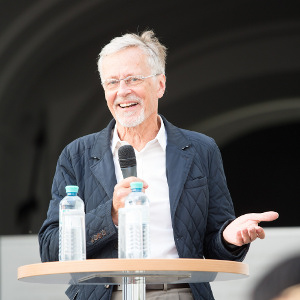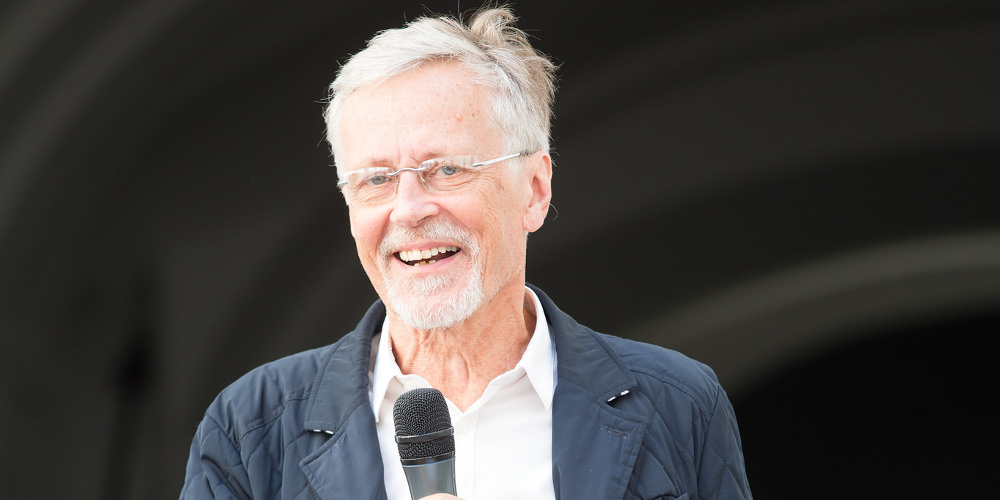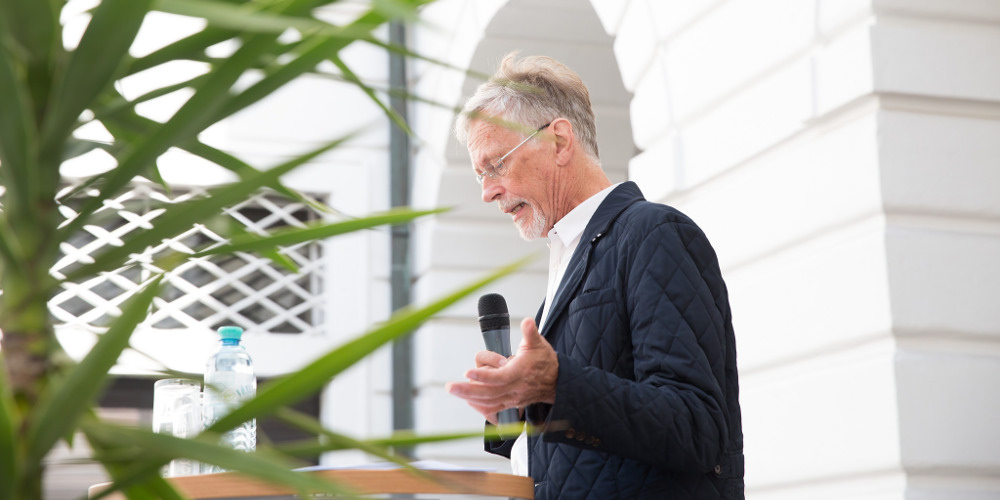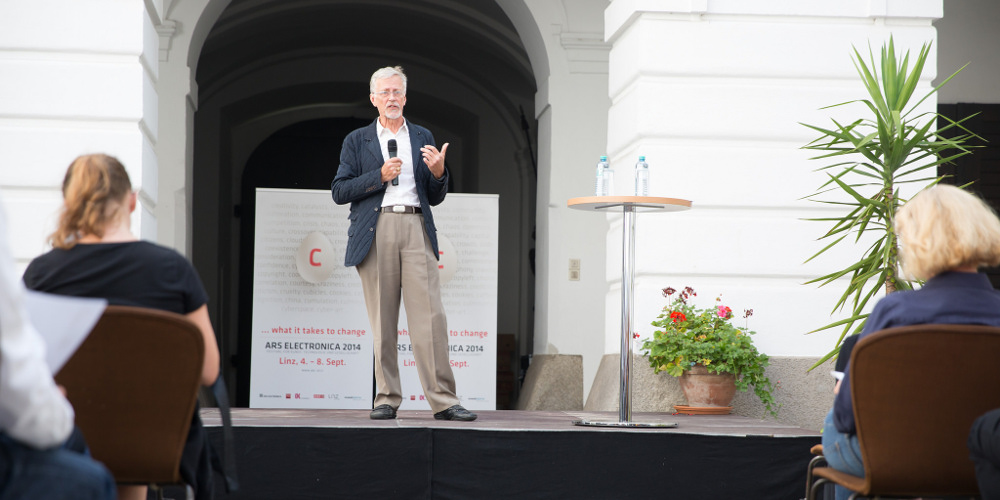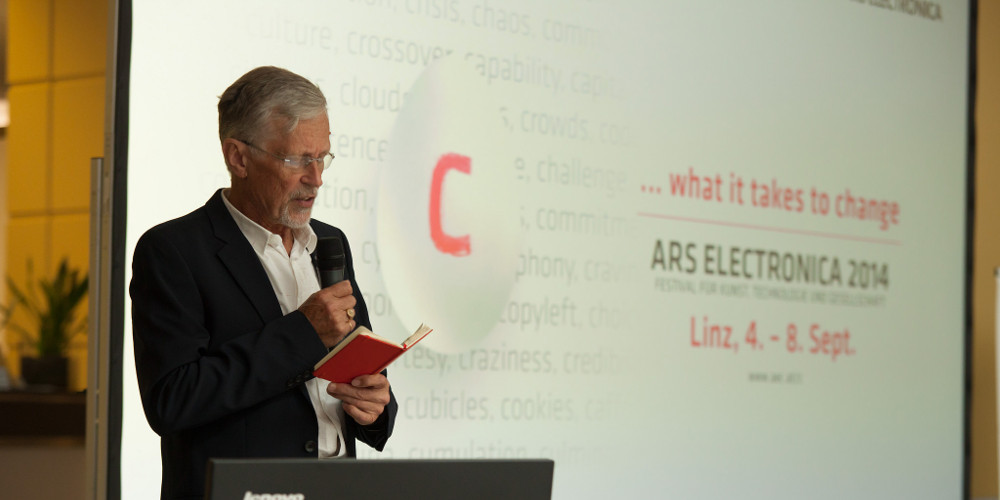One item on the program of the Future Innovators Summit at Festival Ars Electronica 2014 was the Sunday lecture in the idyllic courtyard of the Bischofsitz. Beside famous Benetton-advertising photographer Oliviero Toscani Derrick de Kerckhove participated at this Symposium. Derrick de Kerckhove was long-time director of the Marshall McLuhan Center, author of many books and is professor at the University of Toronto. Beside his interest in questions concerning communication, he supports new artistic developments that combine art, technology and emerged media communication. He is currently researching the effects of technology on the human consciousness.
The topic of de Kerckhove’s talk was “What it takes to change?” and there he told us, change begins in people’s heads and we need narratives to get this going on. Narratives that update or replace old clichés and outworn patterns of thinking.
After the Sunday lecture festivalgoers had the opportunity to meet Derrick de Kerckhove and chat with him in person. We also took this opportunity and talked with him about his thoughts and ideas of “What it takes to change?”
What are the most important things that have to be changed right now?
Derrick de Kerckhove: It’s very sentimental: attitude. I really think that’s the key, because attitude is the shape that you give to the world and to yourself. Attitude is the wave that you project and the world response to exact the same kind of. This is like on a personal basis, if you are talking about our collective basis… I’m a revolutionary. I think the big financiers, the whole collusion, the guys that were shown by this year’s Prix Ars Electronica winner Paolo Cirio – these guys have to change or we change them. And that’s what the revolution is all about. That is destroying everything. Why is it, that the people, who are making the most money are paying the less to the society? It shouldn’t be! That has to change. We have to do something to prevent that forever. And that’s what I’m saying.
If everything is going to be known about us – guys we vote for you, if we know everything about you.
You said we need narratives for changes. Which narratives do you mean with that?
Derrick de Kerckhove: I actually must say, that I have started the narrative issue from the time of the Greeks. The moment you start having a personality you start responsibility towards your destiny. How is your destiny talked about? You are born, you live and then you die. It’s a one way street. Something the Greeks had expressed with the goddesses of life and death. One was weaving the line of life. His name was Clotho. And the other one was measuring the destiny of the person and her name was Lachesis. And then came Atropos, who cut the wire – not good. Well, that’s actually the story. That’s the first narrative of the western world. There is a big resistance to narratives in the postmodern society. They try to get rid of all the narratives and we are trying to get them back. We are trying to get back the essence of meaning of destiny, but the previous meanings doesn’t work anymore today. So we have to find another order of how this is going to work. Our narrative is a very strange story. It’s hypertext. It’s a problem.
You also say we have to occupy and manage three different spaces in life, the physical, the mental and the virtual space…
Derrick de Kerckhove: We spent most of our time divided between these three spaces and the sad thing is it got less and less in the mental one. We are all on screen, we are on the virtual space… You all can’t deny that. So we thought of how to occupy physical space. You know, we all drive cars or ride bicycles and think during driving and we have trained the mental space up to a point. The virtual space has its own code, has its own behavior and expresses us differently. We occupy an entire screen and we occupy this kind of multimedia environments, but all these things are actually not well known yet. We still learn how to make use it and in effect the people who are the best users, of course, are the kids. They have got their system completely wired for good.
What do you exactly mean with an ethic of transparency?
Derrick de Kerckhove: Well, I’m glad you asked. It’s based on the promise that transparency is now unavailable. I recommend to the Ars Electronica Center and see the exhibition “Out of Control” which is about how we are traced. It’s really important to do that. Why? Because we are not yet aware of what is really happening.
On the other hand transparency is going to be our condition where opacity has been the condition of the private individual. The individual was co-private because precisely there were walls and opaque that actually prevented people from penetrate. The Spanish inquisition was like putting the question to people, because they wanted to enter in that place which was to be secret. That’s really a story that happened. That’s a narrative – a pretty nasty one and we don’t like more of those. No, I think that’s exactly what the problem has been. To what extend can we actually recover a social order that reconciles the needs of the identity we have eventually been learning to have and how long will we keep it. And the kind of identity is profiling themselves in their databases and their internet. It’s true: the self distributes itself. How did it start? Roy Ascott said in one of his speeches we got many selves. He is absolutely correct. That’s a pretty revolutionary thought in itself.
